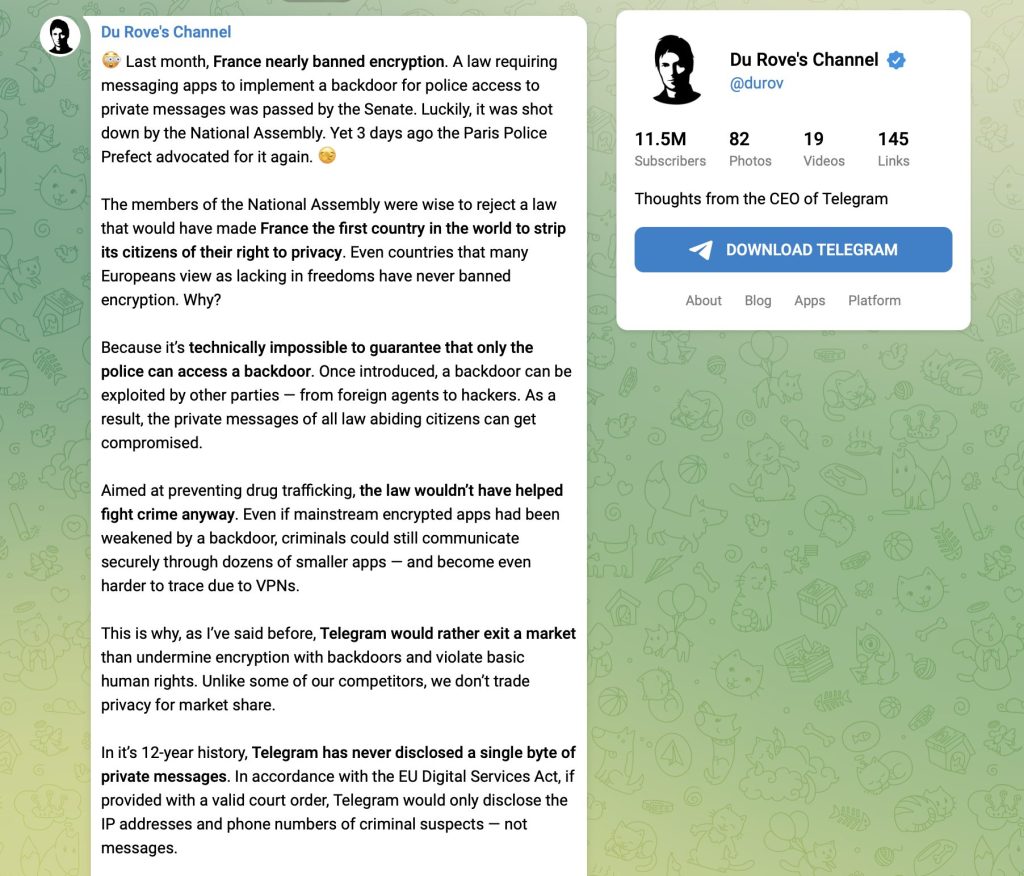
Important takeouts:
- Durov stressed that the background to encryption could be exploited by hackers, foreign agents and other malicious actors, so it is limited to the use of law enforcement and cannot pose serious risks.
- Telegram updated its terms in September 2024, allowing it to share its IP address and telephone number with the authorities if a valid court order is presented.
Telegram CEO Pavel Durov has issued a strong statement reaffirming the platform’s commitment to user privacy, even when it means leaving a certain market.
This is in response to recent legislative attempts in France and elsewhere in the European Union, and seeks to mandate backdoor access to law enforcement’s encrypted messages.
Durov referenced a recent French Senate proposal that called for a messaging platform to introduce cryptographic backdoors.
The law was ultimately rejected by the Parliament, but a conversation about weakening encryption for law enforcement purposes has recently been proposed by the Commissioner of Police in Paris. Durov warned that such efforts pose a threat to user privacy and digital freedom.

“Even countries that are often criticized as lacking civil liberties have never banned encryption,” Doloff said.
He highlighted the technical risks of backdoors, explaining that the presence of such vulnerabilities cannot be limited to law enforcement use alone.
Laws against criminals who move to unregulated apps
Durov also questioned the effectiveness of such laws in the fight against crime.
He pointed out that criminals would move to smaller, unregulated apps and use VPNs to avoid detection, but that law-abiding citizens would suffer the consequences of privacy violations.
Known for its encrypted communications capabilities, Telegram maintains a strict attitude towards protecting user data. In its 12-year history, the company claims it has never disclosed private message content.
Under the EU Digital Services Act, Telegram will only provide limited metadata, such as IP addresses and telephone numbers, to authorities with valid court orders, rather than the content of the message itself.
Telegram policy changes implemented in September
Despite this solid stance, Telegram introduced policy changes in September 2024 and updated its terms of service due to limited data disclosure to law enforcement agencies.
Under Section 8.3 of the updated terms, Telegram now shares user IP addresses and telephone numbers upon receipt of legal requests, such as warrants issued by the court.
Still, Durov made it clear that Telegram’s core principles remain intact. “We do not exchange market share and privacy.”
Doloff’s message is unclear, especially as pressure from regulatory bodies continues, especially from the latest push on the European Commission’s oversight capabilities. Telegram CEO said he would not compromise on encryption even if he had to leave a particular country to maintain it.
Telegram CEO arrests and endures censorship
Last year, Durov was arrested on August 24th at an airport outside Paris, France. The Russian-born billionaire has been charged with numerous crimes allegedly perpetrated by drug trafficking, the spread of child pornography, fraud, financial laundry and the illegal provision of cryptographic services.
Since Durov’s release, Telegram has faced pressure from the government to share user data.
Daria Lysenko, a crypto attorney at law firm SBSB, said recently that the regulatory environment has been changing, and tech companies like Telegram may be forced to follow the government’s demands to share private user information.
Is user privacy at risk for post telegrams? CEOs are the first to threaten EU exits via crypto backdoor push on Cryptonews.







